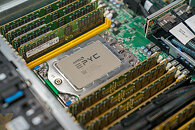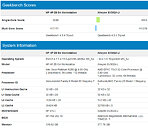- Joined
- Aug 19, 2017
- Messages
- 2,811 (1.02/day)
AMD is expected to announce its upcoming EPYC lineup of processors for server applications based on the new Zen 3 architecture. Codenamed "Milan", AMD is continuing the use of Italian cities as codenames for its processors. Being based on the new Zen 3 core, Milan is expected to bring big improvements over the existing EPYC "Rome" design. Bringing a refined 7 nm+ process, the new EPYC Milan CPUs are going to feature better frequencies, which are getting paired with high core counts. If you are wondering how Zen 3 would look like in server configuration, look no further because we have the upcoming AMD EPYC 7543 32-core processor benchmarked in Geekbench 4 benchmark.
The new EPYC 7543 CPU is a 32 core, 64 thread design with a base clock of 2.8 GHz, and a boost frequency of 3.7 GHz. The caches on this CPU are big, and there is a total of 2048 KB (32 times 32 KB for instruction cache and 32 times 32 KB for data cache) of L1 cache, 16 MB of L2 cache, and as much as 256 MB of L3. In the GB4 test, a single-core test produced 6065 points, while the multi-core run resulted in 111379 points. If you are wondering how that fairs against something like top-end Intel Xeon Platinum 8280 Cascade Lake 28-core CPU, the new EPYC Milan 7543 CPU is capable of fighting two of them at the same time. In a single-core test, the Intel Xeon configuration scores 5048 points, showing that the new Milan CPU has 20% higher single-core performance, while the multi-core score of the dual Xeon setup is 117171 points, which is 5% faster than AMD CPU. The reason for the higher multi-core score is the sheer number of cores that a dual-CPU configuration offers (32 cores vs 56 cores).

View at TechPowerUp Main Site
The new EPYC 7543 CPU is a 32 core, 64 thread design with a base clock of 2.8 GHz, and a boost frequency of 3.7 GHz. The caches on this CPU are big, and there is a total of 2048 KB (32 times 32 KB for instruction cache and 32 times 32 KB for data cache) of L1 cache, 16 MB of L2 cache, and as much as 256 MB of L3. In the GB4 test, a single-core test produced 6065 points, while the multi-core run resulted in 111379 points. If you are wondering how that fairs against something like top-end Intel Xeon Platinum 8280 Cascade Lake 28-core CPU, the new EPYC Milan 7543 CPU is capable of fighting two of them at the same time. In a single-core test, the Intel Xeon configuration scores 5048 points, showing that the new Milan CPU has 20% higher single-core performance, while the multi-core score of the dual Xeon setup is 117171 points, which is 5% faster than AMD CPU. The reason for the higher multi-core score is the sheer number of cores that a dual-CPU configuration offers (32 cores vs 56 cores).


View at TechPowerUp Main Site











